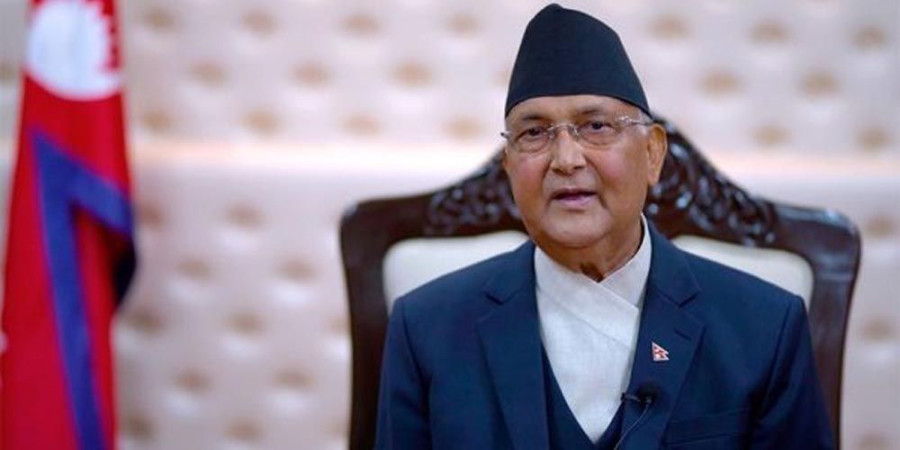National
In address to nation, Oli repeats misinformation and provides no concrete plans
In his third address in two months, the prime minister commended his government’s efforts to combat Covid-19, but provided little of substance even as cases continue to rise.
Anil Giri
Prime Minister KP Sharma Oli took to the podium once again on Monday, for the third time in two months, to address the nation. And once again, his 21-minute address consisted of much rhetoric and not enough substance.
In characteristic fashion, Oli made a number of unsubstantiated claims regarding the Covid-19 pandemic and two months into a lockdown, went on to enumerate what his government will now do.
Oli’s address to the nation comes amid criticism for his government’s failure to utilise the lockdown, which entered its 63rd day on Monday, to prepare properly to respond to Covid-19. Every day, the number of coronavirus cases in the country continues to rise, with over 600 infections and four deaths. The Health Ministry, earlier on Monday, confirmed the presence of the virus in a man who died nine days ago in Bara.
Oli, however, did not appear to have been updated about the new numbers as he said that three people had died so far, before going on to assure the nation that Nepalis would beat Covid-19. Except for “strong will-power and immunity,” Oli had few ideas on how exactly Nepalis would beat a disease that has brought much of the world to its knees.
Referring to his address last month, Oli recalled saying that the coming months would be challenging, but at least the World Health Organization had upgraded Nepal from a “high risk zone” to just “risk zone”.
There is no evidence that the World Health Organization has ever revised Nepal’s risk status, according to a fact check from South Asia Check on April 28, after some media began reporting the upgrade.
Dr Bikash Devkota, spokesperson for the Health Ministry, told the Post that he did not have any idea regarding WHO's risk classification for Nepal.
“I am not in a position to say anything as I have never heard anything regarding WHO downgrading Nepal’s risk level," Devkota said when asked about the prime minister’s claim.
Oli went on to say that his government is well aware of the fact that the battle against Covid-19 is going to be long and challenging.
“But Nepal’s preparations will meet the challenges because Nepal’s result is satisfactory among some countries that are badly hit hard by the pandemic,” said Oli. “Some early measures, like lockdown, restriction of international flights, and closing down the border, have put Nepal in a relatively safer position compared to some other countries. But it is not enough.”
The Oli administration might have locked down the country and sealed its borders but it is also facing much criticism for its poor handling of migrant workers who want to return home from India. There have been numerous complaints about poorly managed quarantine facilities in various border districts, a lack of isolation facilities, and inadequate testing.
Amid growing calls to evacuate Nepalis from abroad as well as India in a proper manner, Oli said that the government will announce a plan to bring back Nepali nationals stranded in various countries, focusing on those who have emergencies.
“I have spoken with the heads of government and state of countries where a majority of Nepalis work. Responding to my request to take care of Nepalis, they have given me assurances,” said Oli. “I thank them all.”
The Oli administration, however, has yet to come up with a detailed plan to bring back Nepalis from abroad.
“An order to bring a detailed plan and guidelines to bring back stranded Nepalis will be issued very soon,” said the prime minister.
Oli, like last week in Parliament, indirectly blamed India for the influx of migrant workers who are testing positive for Covid-19. He had then said that the Indian virus looks more lethal than the Chinese or Italian virus. This time, he accused India of sending Nepali migrant workers home without testing them at the border.
“As per WHO protocol, those returning home should have been mandatorily tested before they crossed the border, which could have prevented the virus from spreading to the community,” Oli said. “Nepalis from India are entering without following rules and testing. This too has contributed to the further spread of Covid-19.”
Some believe Oli’s references to India, at a time when Kathmandu and New Delhi are at loggerheads over Kalapani-Lipulekh-Limipiyadhura, is provocative.
Constantino Xavier, a fellow at Brookings India, a think tank in New Delhi, who closely follows South Asia and Nepal-India relations, said on Twitter that Oli’s reference might be “probably correct”, but was “escalatory” in the current context.
Oli also commended the fact that the fatality rate in Nepal is low compared to other South Asian countries.
“To be able to help people recover, from a two-month-old infant to an 81-year-old woman, is an achievement,” said Oli. “But we are not in a situation to be complacent.”
Oli said that testing will be expanded and that the government is planning to conduct tests of at least 2 percent of the country's population.
So far four deaths have been linked to Covid-19 but reports from around the country tell of more deaths that can be blamed on the lockdown and the government’s failure to provide for the most vulnerable. From daily wage workers to new mothers, more people have died due to government incompetence than the coronavirus.




 16.12°C Kathmandu
16.12°C Kathmandu













